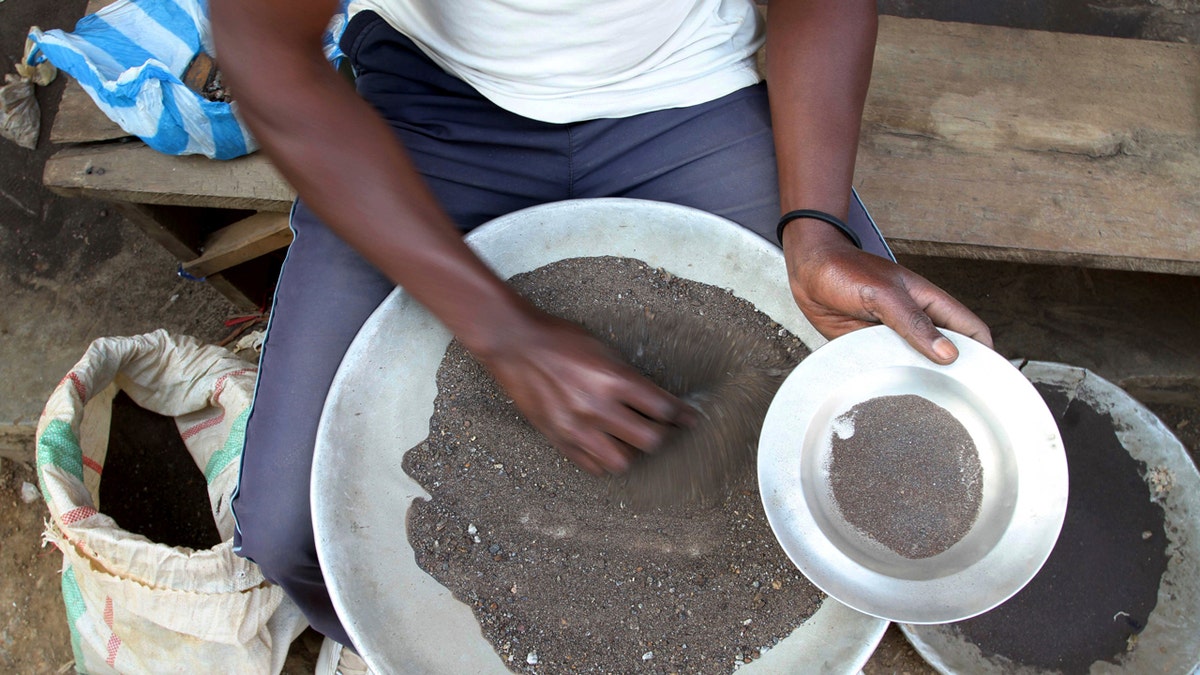Armed rebel groups accused of mass killings operate in eastern Congo
Associated Press
Published April 25, 2024
Congo’s government is questioning Apple about the tech company’s knowledge of "blood minerals" from a conflict zone in the African country that could be smuggled into its supply chains and is demanding answers within three weeks.
A group of international lawyers representing Congo said Thursday that they sent letters to Apple’s CEO Tim Cook and its French subsidiary this week, raising concerns about human rights violations involving the minerals extracted from mines in the country’s troubled east that might end up being used in the company’s products.
AT LEAST 250,000 DISPLACED AS CONFLICTS RAGE ON IN THE CONGO

They included a list of questions challenging Apple to show how it monitors its supply chains in a region where more than 100 armed rebel groups operate, some of whom have been accused of carrying out mass killings of civilians.

A Congolese miner sifts through ground rocks to separate out the cassiterite, the main ore that is processed into tin, in the town of Nyabibwe, eastern Congo, Aug. 16, 2012. Congo’s government is questioning Apple about the tech company’s knowledge of "blood minerals" from a conflict zone in the African country that could be smuggled into supply chains. A group of international lawyers representing Congo said Thursday, April 25, 2024, that it sent letters to Apple’s CEO Tim Cook and its French subsidiary this week raising concerns about human rights violations involving the minerals extracted from mines in the country’s war-torn east. (AP Photo/Marc Hofer)
Writing to Cook, the lawyers said "it has become clear to us that year after year, Apple has sold technology made with minerals sourced from a region whose population is being devastated by grave violations of human rights."
"The iPhones, Mac computers and accessories that Apple sells to its customers around the world rely on supply chains that are too opaque, and that are tainted by the blood of the Congolese people," the lawyers said.
Eastern Congo is one of the most mineral-rich regions in the world but is also the site of a huge humanitarian disaster, with the armed groups fighting for years for control of the mines and the valuable minerals in them, and millions of people displaced and affected by the worsening violence. The situation has deteriorated badly in the last few months.
Apple, which has a market value of around $2.6 trillion, has denied using minerals from mines and regions where human rights violations take place, saying it conducts business ethically and "responsibly" sources minerals in Congo and neighboring countries.
The minerals it buys don't finance war or armed groups, it says. The lawyers for the Congo government said "those claims do not appear to be based on concrete, verifiable evidence."
The Congo government said it has suspicions that some of the tin, tungsten, tantalum and gold — known as the 3TG critical minerals — that Apple sources from suppliers is smuggled out of Congo to neighboring Rwanda and then infiltrated into the global supply chain. The 3TG minerals are key components in electronics.

In response to a request for comment, Apple pointed to a section from a company filing on conflict minerals.
"Based on our due diligence efforts, including analyzing the information provided by third-party audit programs, upstream traceability programs, and our suppliers, we found no reasonable basis for concluding that any of the smelters or refiners of 3TG determined to be in our supply chain as of December 31, 2023 directly or indirectly financed or benefited armed groups in the DRC or an adjoining country," the report said, using the abbreviation for Democratic Republic of the Congo.
"In Congo, people have been dying for 30 years as a result of illegal mining," Congo government spokesperson Patrick Muyaya said. "We want clarification on the sources of supply for major technology companies, in particular Apple, to verify whether they are acquiring minerals produced in completely illegal conditions."
He said Rwanda "is presented" as the supplier for many of the minerals while having few reserves of its own.
Congo has accused Rwanda of financing and directing the notorious armed rebel group M23 in eastern Congo to help extract minerals illegally. The United Nations also says M23 is backed by Rwanda.
Rwanda denies that but tensions between the countries are flaring, while M23 and other groups are accused of regularly carrying out attacks that include the killing and raping of civilians, according to Human Rights Watch.
The lawyers for the Congo government quoted a 2022 report by nonprofit group Global Witness that claimed Apple had previously applied "few meaningful mitigation measures" to avoid using smuggled minerals.
The Congo government was now seeking "effective redress" against "end-users of blood minerals" across the world, the lawyers said.
They asked Apple to respond to questions over its supply chain controls within three weeks and said they had compiled a report on "the laundering" of Congo's minerals by Rwanda and private entities that would be made public this month.
They also would seek instructions from the Congo government as to what legal measures it is considering against Apple, the letter said.
No comments:
Post a Comment